|
|
|
Sort Order |
|
|
|
Items / Page
|
|
|
|
|
|
|
| Srl | Item |
| 1 |
ID:
174677
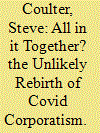

|
|
|
|
|
| Summary/Abstract |
The battle to soften the labour market impact of the pandemic has thrown up some unlikely bedfellows, with trade union leaders competing with business chiefs over who can most fulsomely praise the government’s economic response. But does this entente really presage a new era of ‘Covid‐corporatism’? Crises like Covid‐19 can provide opportunities for temporary social pacts, even in countries lacking the labour market institutions needed to sustain these in normal times, and the ‘social partners’ have shown an unusual willingness to be bold and constructive. But cracks are already appearing over how and when the state should begin its withdrawal from the economy. Unions face structural weaknesses and recruitment problems that will hamper their ability to take full advantage of what will likely prove to be only a temporary lull in hostilities.
|
|
|
|
|
|
|
|
|
|
|
|
|
|
|
|
| 2 |
ID:
174683


|
|
|
|
|
| Summary/Abstract |
After more than a decade of rapid growth, the worldwide fact‐checking movement has surged since 2016, fuelled by rising concern about the political and social influence of online misinformation. This movement is also changing in ways that deserve close attention, as understanding and mitigating the spread of false information across digital networks has become an urgent priority for governments, charitable foundations, academic researchers, and technology companies. This research brief presents a snapshot of the field based on a mid‐2019 survey designed to reveal how fact‐checking organisations understood their mission, where they were directing their resources, and how their focus had shifted in the last several years. We found evidence of diverging missions in the fact‐checking world, as a focus on combatting online misinformation began to supersede one on checking rhetoric from public figures.
|
|
|
|
|
|
|
|
|
|
|
|
|
|
|
|
| 3 |
ID:
174676


|
|
|
|
|
| Summary/Abstract |
More urgently than ever we need an answer to the question posed by the late Mick Moran in The Political Quarterly nearly two decades ago: ‘if government now invests huge resources in trying to be smart why does it often act so dumb?’. We reflect on this question in the context of governmental responses to Covid‐19 in four steps. First, we argue that blunders occur because of systemic weaknesses that stimulate poor policy choices. Second, we review and assess the performance of governments on Covid‐19 across a range of advanced democracies. Third, in the light of these comparisons we argue that the UK system of governance has proved itself vulnerable to failure at the time when its citizens most needed it. Finally, we outline an agenda of reform that seeks to rectify structural weaknesses of that governance capacity.
|
|
|
|
|
|
|
|
|
|
|
|
|
|
|
|
| 4 |
ID:
174692


|
|
|
|
|
| Summary/Abstract |
Universities UK (UUK) has suggested that there may be very significant losses to higher education as a consequence of Covid‐19. However, losses are likely to be substantially lower than the potential losses estimated by UUK. But the magnitude of losses is very uncertain. The UUK’s proposal to restrict undergraduate enrolment per university to stop institutions poaching students is not in the interests of the most highly regarded universities, or that of students. Some rationalisation of the sector should be the price of further government support. Now is also the time to reconsider how university research is funded.
|
|
|
|
|
|
|
|
|
|
|
|
|
|
|
|
| 5 |
ID:
174673


|
|
|
|
|
| Summary/Abstract |
the introduction of devolution in Scotland and Wales, and its reintroduction in Northern Ireland, has wrought a welcome transformation in the governance of the United Kingdom, though this is not a point that contributors to recent debates on devolution dwell on. Instead, for many commentators the extraordinary first few months of the Covid‐19 pandemic have highlighted the tensions inherent within the devolution settlement, notably the curious double role now performed by the British government, which is in charge of the response of the United Kingdom across certain policy areas and in others (notably health) functions as an unacknowledged government of England alone.
|
|
|
|
|
|
|
|
|
|
|
|
|
|
|
|
| 6 |
ID:
174681


|
|
|
|
|
| Summary/Abstract |
Rather than aiming to produce more ‘rational’ or more ‘other‐regarding’ citizen judgements (the outcome of which is uncertain), deliberative democratic exercises should be re‐designed to maximise democratic participation. To do this, they must involve citizens and experts, a novel arrangement that will benefit both cohorts. For the former, a more inclusive form of deliberation will offer an opportunity to contribute to political discussion and be listened to by people with political or policy‐based authority. For the latter, it will provide a venue through which expertise can be brought to bear on democratic decision making without risk of scapegoating or politicisation. More broadly, deliberation that prioritises dialogue (over, say, opinion change) affirms the principle that political decisions reflect value judgements rather than technically ‘right’ or technically ‘wrong’ answers—judgements that are legitimate if arrived at through discussion involving the people due to be affected by the resultant policy. This article sets out the advantages of this form of deliberation—which bears some similarity to certain types of citizen science—in the context of the UK government’s responses to Covid‐19; both the confused decision making evident to date, and the forthcoming re‐opening phases that will prioritise or advantage some constituencies over others.
|
|
|
|
|
|
|
|
|
|
|
|
|
|
|
|
| 7 |
ID:
174689


|
|
|
|
|
| Summary/Abstract |
The growing popularity of Greta Thunberg has led an increasing number of pundits and scholars to consider her message to be an instance of ‘climate’ or ‘environmental’ populism. Following a qualitative content analysis of key speeches by the young activist, this paper challenges this view, and argues that her message is far from being a case of populism. On the contrary, it abides by a substantially different set of ideas that can be defined as technocratic ecocentrism. In particular, it is argued that rather than people‐centrism, anti‐elitism and vox populi, Greta Thunberg’s message is grounded on three different core ideas: ecocentrism, technocracy, and on the exaltation of the vox scientifica. However, whereas Thunberg’s technocratic ecocentrism is at odds with the foundations of the populist set of ideas, it shares a similar emphasis on monism, moralisation, a Manichean vision of the world, a critique of key features of the metapolitical status quo, and a tendency to personalisation.
|
|
|
|
|
|
|
|
|
|
|
|
|
|
|
|
| 8 |
ID:
174682


|
|
|
|
|
| Summary/Abstract |
The Covid‐19 pandemic has revealed and accelerated an information crisis as well as a health one. What we discover about Covid 19, how it spreads, to whom and why and how best to mitigate it—all depend on information. The essays in this special section, which this article introduces, explore the importance of information and the fundamental role of fact checkers in understanding how information flows, why mistakes are made, and how to counteract them. Fact checking as an idea and a practice emerged in the early twenty‐first century, developed as a positive beacon to counteract a growing sense that information could no longer be trusted. Now, more than a decade after its creation, fact checking sits within a far more complex and chaotic media context, and its expertise and understanding has never been so important. We need to understand what fact checkers do because they are grappling with how to tether us to reality.
|
|
|
|
|
|
|
|
|
|
|
|
|
|
|
|
| 9 |
ID:
174684


|
|
|
|
|
| Summary/Abstract |
This article explores how the UK’s fact‐checking organisation Full Fact has sought to tackle misinformation since its inception in 2010. Full Fact describes itself as a ‘second generation’ fact‐checking organisation with dual aims of seeking to stop the spread of specific pieces of inaccurate information and using the evidence base from fact checking to secure systemic changes that help make misinformation rarer and less harmful. Ultimately, we are pursuing culture change. We are trying to create institutions in societies that can help anchor public debate to reality and to challenge the casual acceptance of deceptive and misleading behaviour.
|
|
|
|
|
|
|
|
|
|
|
|
|
|
|
|
| 10 |
ID:
174685


|
|
|
|
|
| Summary/Abstract |
False claims and misinformation spread in Africa not only on Facebook, in WhatsApp groups or on the dark web, but also in political meeting rooms, churches, mosques, and community gatherings. To reduce the harms caused by misinformation, Africa Check, the leading independent fact‐checking organisation on the continent, believes a four‐pronged, or holistic approach is needed: identifying and reducing the circulation of harmful misinformation; ensuring accurate information is more widely available; ensuring a more accurate understanding of topics it covers; and fostering fact‐checking skills among the public. To achieve this, it reaches out and engages with a wide range of on‐ and offline communities and networks. The UK could learn from this approach to tackle the ways that misinformation continues to spread offline today.
|
|
|
|
|
|
|
|
|
|
|
|
|
|
|
|
| 11 |
ID:
174678
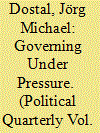

|
|
|
|
|
| Summary/Abstract |
The global threat of the coronavirus pandemic has forced policy makers to react quickly with totally new policy‐making approaches under conditions of uncertainty. This article focuses on such crisis‐driven policy learning, examining how the experiences of China and South Korea as early responder states influenced the subsequent coronavirus crisis management in Germany. The first reaction of the German core executive was the quick concentration of decision‐making power at the top of the political hierarchy. Asserting the prerogatives of the executive included the radical simplification of the relationship between politics, law and science. State actors took emergency measures by recourse to a single piece of legislation—the ‘infection protection law’ (Infektionsschutzgesetz)—overriding other elements of the legal order. They also limited the government’s use of scientific expertise to a small number of advisors, thereby cutting short debates about the appropriateness or otherwise of the government’s crisis measures. Finally, German actors failed to understand that some of the earlier Chinese and Korean responses required a precondition—namely public willingness to sacrifice privacy for public health—that is absent in the German case.
|
|
|
|
|
|
|
|
|
|
|
|
|
|
|
|
| 12 |
ID:
174674


|
|
|
|
|
| Summary/Abstract |
It is commonly said that the lockdowns and social distancing necessary to control coronavirus pandemics will only work if the general population trusts its government, believes the information it provides, and has confidence in its policies. This article traces the British government’s record in providing information about its policies and performance, and compares this with the public’s use of the mainstream news media. It then considers how these two sources of information affected trust in government and public compliance with social distancing and lockdown rules. Lastly, it compares Covid‐19 with Brexit and draws conclusions about how beliefs and behaviour are formed when individuals are personally faced with a serious threat.
|
|
|
|
|
|
|
|
|
|
|
|
|
|
|
|
| 13 |
ID:
174690
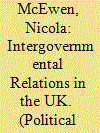

|
|
|
|
|
| Summary/Abstract |
Brexit and the coronavirus pandemic have put relationships between the UK government and its devolved counterparts under growing strain. Tensions generated by both of these developments have exposed the inadequacies of the existing, under‐developed system for bringing governments together in the UK. The limitations of the current system include the ad hoc nature of intergovernmental meetings, and their consultative rather than decision‐making character. Drawing upon an analysis of how intergovernmental relationships are structured in five other countries, the authors offer a number of suggestions for the reconfiguration of the UK model. They explore different ways of enabling joint decision making by its governments, and argue against the assumption that England can be represented adequately by the UK administration. Without a serious attempt to address this dysfunctional part of the UK’s territorial constitution, there is every prospect that relations between these different governments will continue to deteriorate.
|
|
|
|
|
|
|
|
|
|
|
|
|
|
|
|
| 14 |
ID:
174679


|
|
|
|
|
| Summary/Abstract |
Italian politics has always been characterised by deep regional divides. While the north and centre are well integrated into the European economy, southern regions struggle to keep up their productivity and employment levels. Although this divide has a long history, the Covid‐19 crisis is set to worsen the inequality separating the two parts of the country. This article looks at how the coronavirus pandemic immediately assumed a regional dimension, which was reflected not only in the geography of the contagion, but also in how the central state struggled to manage the contrasting demands coming from northern and southern regions. Although the north has been the epicentre of the health crisis, the south is set to pay the highest economic and social price for the lockdown measures. The conclusion suggests that, while the Covid crisis has confirmed the salience of regional divides for Italian politics, it might also strengthen autonomist forces.
|
|
|
|
|
|
|
|
|
|
|
|
|
|
|
|
| 15 |
ID:
174680


|
|
|
|
|
| Summary/Abstract |
The Covid‐19 pandemic has seen most governments worldwide having to think on their feet rather than implementing detailed and well‐rehearsed plans. This is notwithstanding the fact that a pandemic was bound to happen, sooner or later (and will happen again). The effectiveness of national responses has varied enormously. Globally, New Zealand has been perceived as setting the gold standard in ‘curve crushing’, and for a short period achieved Covid‐free status. For this achievement, much credit is due to the New Zealand government, especially to Prime Minister, Jacinda Ardern. However, post‐lockdown the New Zealand government has encountered a number of Covid policy implementation problems (many of which could have been anticipated). Nevertheless, Covid‐19 might still turn out to have been a seismic shock to existing policy processes and policy frames (such as austerity). If so, there are grounds for hope that in the future, governments and voters might be less short‐term in their outlook. Perhaps anticipatory, rather than reactive policy making, might become more fashionable?
|
|
|
|
|
|
|
|
|
|
|
|
|
|
|
|
| 16 |
ID:
174695
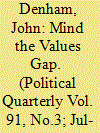

|
|
|
|
|
| Summary/Abstract |
Minds the Values Gap, a report published by The UK in a Changing Europe, highlights the poor alignment of the values expressed within the major parties by their MPs and their activists, with those voters who support them. Voters as a whole tend to the left on economic values, and to the authoritarian on social values. Although the data imply that it is the social authoritarianism that defines both Leave voters and Labour–Conservative switchers, this response argues that issues of national identity, democracy and sovereignty are neglected in that analysis.
|
|
|
|
|
|
|
|
|
|
|
|
|
|
|
|
| 17 |
ID:
174694


|
|
|
|
|
| Summary/Abstract |
The Labour Together review of the 2019 election brings together polling data, survey data, interviews, and submissions from across the Labour movement. An unpopular leader, tensions around the Brexit position, and a manifesto which was not seen as credible, are all found to have contributed to the scale of the defeat, but Labour’s unexpectedly strong performance in 2017 also masked long‐term issues in its connection with the electorate and within the party’s campaign organisation. The report attempts to move beyond simply diagnosing the difficulties the party faces, but some of the thorniest issues for the party to resolve are nonetheless left unresolved.
|
|
|
|
|
|
|
|
|
|
|
|
|
|
|
|
| 18 |
ID:
174691
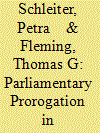

|
|
|
|
|
| Summary/Abstract |
This paper examines the power to prorogue (or suspend) Parliament following the 2019 prorogation controversy in the UK. We outline the legal basis of prerogative‐based prorogation, survey its uses in the UK and other Westminster systems, and compare it with equivalent rules in other European parliamentary democracies. The comparative perspective highlights the outlier status of the UK among comparable European democracies. In the UK, the absence of explicit legal limits on the use of prorogation gives the executive exceptional scope to employ the power for political purposes to sidestep Parliament. We conclude by discussing the implications of these findings for current discussions about the desirability of reforming the UK’s prorogation rules and placing express legal limits on the executive’s power.
|
|
|
|
|
|
|
|
|
|
|
|
|
|
|
|
| 19 |
ID:
174687


|
|
|
|
|
| Summary/Abstract |
The fact checking field has grown tremendously in the past decade, as has academic interest in the practice, with dozens of studies testing the effectiveness of corrections. However, research on fact checking is not yet optimised to help fact checkers address the global challenges of mis‐ and disinformation. In this paper, we review the literature on fact checking’s effects and identify two key gaps. First, we discuss the limited diversity and external validity of existing studies, which have overwhelmingly been conducted in Western countries and under artificial, experimental conditions. Second, we argue that research has narrowly focussed on the short‐term, corrective effects of individual fact checks, largely ignoring the multiple ways fact checkers conceive of their impact. Thus, research has overlooked the cultural and systemic changes that fact checkers pursue. We conclude by highlighting opportunities for further research and for improving communication between academics and fact checkers.
|
|
|
|
|
|
|
|
|
|
|
|
|
|
|
|
| 20 |
ID:
174675


|
|
|
|
|
| Summary/Abstract |
The challenge for experts in government is often described as one of speaking unwelcome truths to a resistant power. Yet, just as problematic can be instances where the advice is welcome and so left unchallenged. Two such cases in which the UK government followed flawed expert advice are considered: intelligence assessments and military advice leading up to the 2003 Iraq War and the role of SAGE (the Scientific Advisory Group for Emergencies) during the first stages of the Covid‐19 pandemic in 2020. Governments need to interrogate advice and make sure that they understand its underlying assumptions and implications. It remains vital to protect the independence of the experts, but to get the best out of their advice early and active political engagement is required rather than an arms‐length relationship.
|
|
|
|
|
|
|
|
|
|
|
|
|
|
|
|
|
|
|
|
|